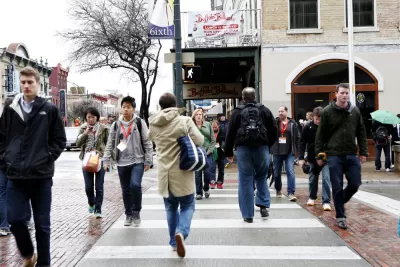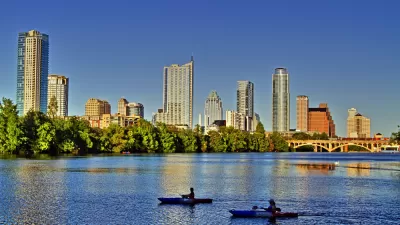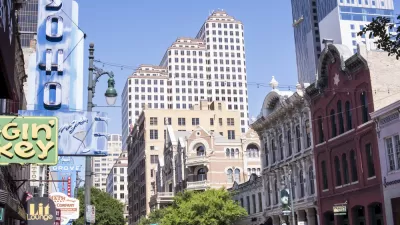It was a big day for planners and planning in Austin earlier this week, when the city released the 1,100-page first draft of the city's new zoning code—the first major revision of the city's zoning doe since the mid-1980s.

"After nearly three years of work as part of a process dubbed CodeNEXT, city officials on Monday morning released the first draft of Austin’s new land development code," reports Christopher Neely.
"The code aims to balance what Adler referred to as the 'Austin bargain,'" explains Neely, "an attempt at protecting the character of the city’s existing neighborhoods while allowing density along the city’s main corridors."
At this point in the CodeNext approval process, consultant Opticos is handing off the drafting process to the city's Code Advisoy Group, which will manage public outreach.
In a separate article focusing more on substance, rather than process, Neely interviews "four of the code’s architects Monday afternoon to discuss some of the biggest takeaways from the city’s first official draft of the land development code." A transcript of an interview with officials from the city of Austin's Planning and Zoning Department, as well the leader of the project from the Opticos team, makes up the bulk of this follow-up article.
FULL STORY: Austin officials release first official CodeNEXT draft

Planetizen Federal Action Tracker
A weekly monitor of how Trump’s orders and actions are impacting planners and planning in America.

Maui's Vacation Rental Debate Turns Ugly
Verbal attacks, misinformation campaigns and fistfights plague a high-stakes debate to convert thousands of vacation rentals into long-term housing.

San Francisco Suspends Traffic Calming Amidst Record Deaths
Citing “a challenging fiscal landscape,” the city will cease the program on the heels of 42 traffic deaths, including 24 pedestrians.

Amtrak Rolls Out New Orleans to Alabama “Mardi Gras” Train
The new service will operate morning and evening departures between Mobile and New Orleans.

The Subversive Car-Free Guide to Trump's Great American Road Trip
Car-free ways to access Chicagoland’s best tourist attractions.

San Antonio and Austin are Fusing Into one Massive Megaregion
The region spanning the two central Texas cities is growing fast, posing challenges for local infrastructure and water supplies.
Urban Design for Planners 1: Software Tools
This six-course series explores essential urban design concepts using open source software and equips planners with the tools they need to participate fully in the urban design process.
Planning for Universal Design
Learn the tools for implementing Universal Design in planning regulations.
Heyer Gruel & Associates PA
JM Goldson LLC
Custer County Colorado
City of Camden Redevelopment Agency
City of Astoria
Transportation Research & Education Center (TREC) at Portland State University
Jefferson Parish Government
Camden Redevelopment Agency
City of Claremont





























